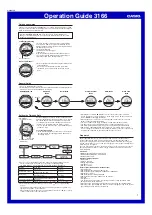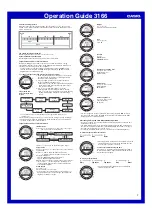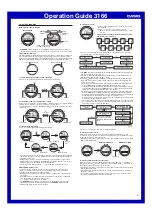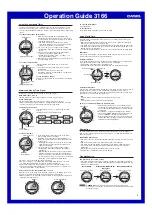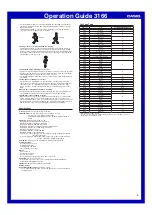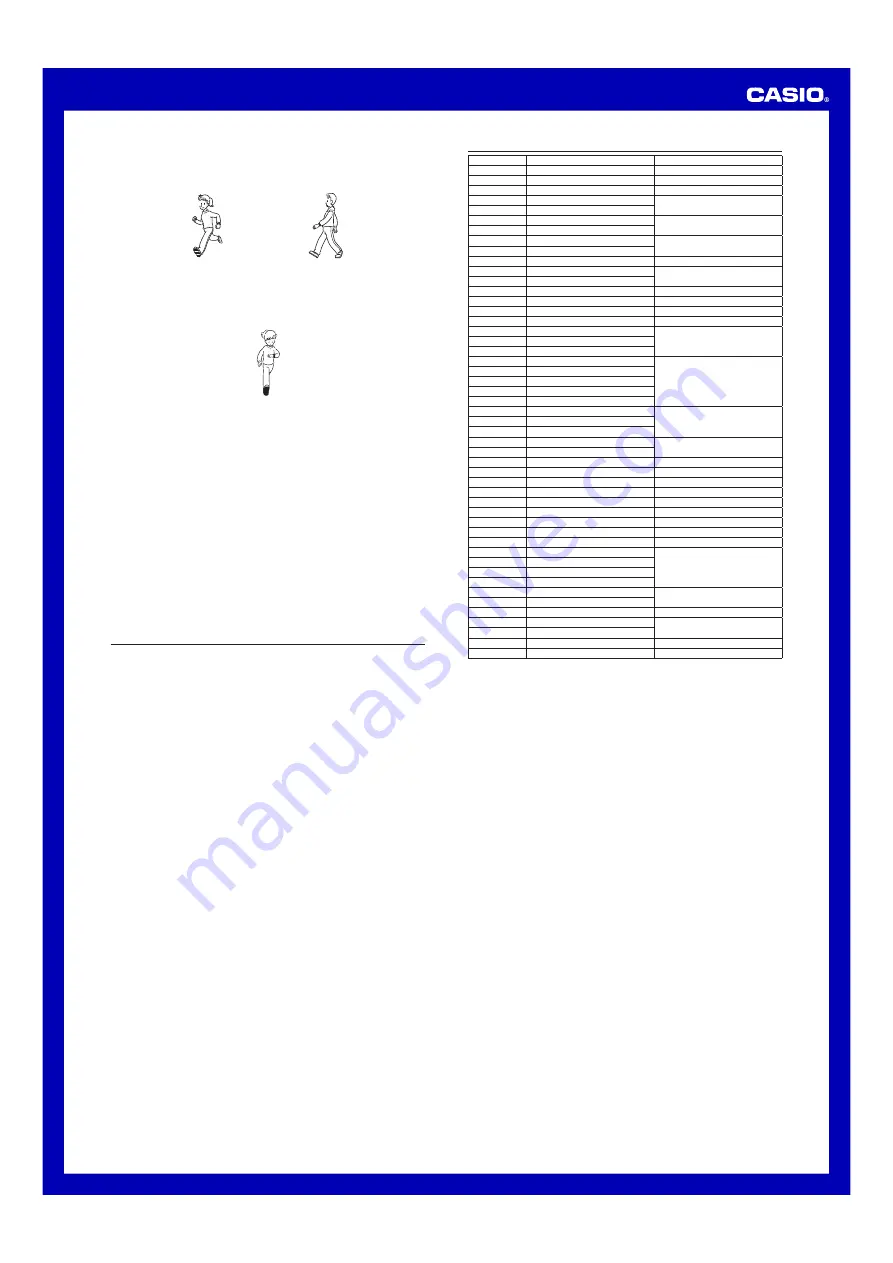
Operation Guide 3166
5
•
The watch will detect when you start running while an elapsed time measurement
operation is in progress. At this time it will start displaying the number of steps you
take and other data.
•
This watch is designed to count your steps only while you are running. It will not
count your steps correctly while you are walking.
Running
Walking
City Code Table
City Code
City
UTC Offset/GMT Differential
PPG
Pago Pago
–11
HNL
Honolulu
–10
ANC
Anchorage
–9
YVR
Vancouver
–8
LAX
Los Angeles
YEA
Edmonton
–7
DEN
Denver
MEX
Mexico City
–6
CHI
Chicago
NYC
New York
–5
SCL
Santiago
–4
YHZ
Halifax
YYT
St. Johns
–3.5
RIO
Rio De Janeiro
–3
FEN
Fernando de Noronha
–2
RAI
Praia
–1
UTC
Coordinate Universal Time
0
LIS
Lisbon
LON
London
MAD
Madrid
+1
PAR
Paris
ROM
Rome
BER
Berlin
STO
Stockholm
ATH
Athens
+2
CAI
Cairo
JRS
Jerusalem
MOW
Moscow
+3
JED
Jeddah
THR
Tehran
+3.5
DXB
Dubai
+4
KBL
Kabul
+4.5
KHI
Karachi
+5
DEL
Delhi
+5.5
KTM
Kathmandu
+5.75
DAC
Dhaka
+6
RGN
Yangon
+6.5
BKK
Bangkok
+7
SIN
Singapore
+8
HKG
Hong Kong
BJS
Beijing
TPE
Taipei
SEL
Seoul
+9
TYO
Tokyo
ADL
Adelaide
+9.5
GUM
Guam
+10
SYD
Sydney
NOU
Noumea
+11
WLG
Wellington
+12
•
Based on data as of March 2008.
•
The rules governing global times (GMT differential and UTC offset) and summer time are
determined by each individual country.
The step count does not change while I am running.
•
This watch is designed to count your steps only while you are running. A built-in
sensor detects the movement of your arms to determine whether you are running.
Because of this, looking at the watch while running as shown in the illustration may
make it impossible for the watch to detect that you are running. Let your arm swing
naturally by your side as you run.
The measured distance reading is not correct.
•
This watch calculates distance based on the number of steps you take and the stride
length you specify as part of your personal information. Check to make sure that the
stride length setting of your personal information is correct.
•
The displayed distance will not be correct if you change your stride length while you
are running.
The average pace reading is not correct.
•
The average pace is displayed for a lap or split time. A sudden drop in running
speed (such as a shift from very fast running to a pace that is close to walking) will
cause the watch to re-evaluate whether you are still running. In this case, if you
reduce your pace, the same average pace value will remain displayed for a short
while.
Steps are not counted while an alarm is sounding.
•
This watch is designed to pause its step count while an alarm is sounding. Such a
short interruption should affect only short distance and short time running.
The number of steps suddenly increases.
•
When the watch’s sensor does not detect running movement for a certain amount
of time, it judges that you are not running and stops the step count. If the sensor
detects running movement again for a certain amount of time, it starts the count. The
watch keeps track of your steps during the time it is making its judgment, and it will
add those steps to your count if it ultimately decides that you are running.
Specifications
Accuracy:
Within ±15 seconds average per month
Timekeeping:
Month, day, day of the week, hour, minute, second,
a.m./p.m. (P), 12-hour/24-hour time format,
Standard Time/Daylight Saving Time, Full Auto Calendar (2000 to
2099)
Stopwatch:
Measuring unit: 1/100 second
Measuring Capacity: 99:59'59.99'' (100 hours)
Maximum Number of Lap/Split Times: 999
Cumulative Distance: 999.9 km/621.1 miles
Cumulative Energy Consumption: 23,900.5 kcal/99,999.9 kJ
Cumulative Exercise Time: 9999 hours, 59 minutes
Maximum Average Pace: 220
Cumulative Number of Steps: 999,999
Maximum Number of Laps/Splits: 150
Target Value Input: Target type selection (distance, energy consumption, elapsed
time) and target value
Personal Information Input: Stride length, weight, age, gender, unit switching (for
energy consumption, weight, stride length)
Recall Mode:
Workout records, monthly data, cumulative data, best lap
Countdown Timer:
Countdown Unit: 1 second
Setting Unit: 1 minute
Setting Range: 100 hours
Time Up Beeper: 5 seconds
Alarms:
Daily alarms: 5
Settings: Hour, minute
Beeper: 10 seconds
Hourly Time Signal: Beeps twice every hour on the hour
World Time:
48 cities, 31 time zones
Hour, minute, second (second count coordinated with Timekeeping Mode)
Standard Time/Daylight Saving Time
Illumination:
EL (electronic-luminescent) backlight
Battery:
CR2025
Approximate Battery Life:
Approximately 3 years
* 1 hour elapsed time operation, 1.5 seconds light operation, 10 seconds buzzer
operation per day

